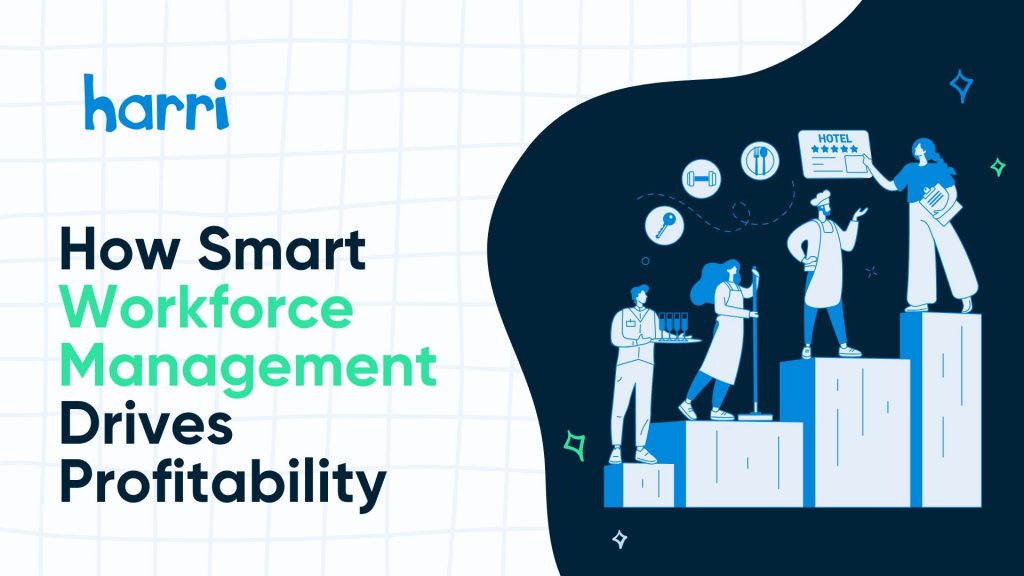How Smart Workforce Management Drives Profitability in UK Hospitality

- By Harri Insider Team | October 28, 2024
The UK hospitality industry is under immense pressure. With labour shortages, rising wages, and complex compliance requirements, operators are having to strike the right balance to stay profitable. The recent 9.8% increase in the National Living Wage has only intensified the need for efficient workforce management. Smart scheduling, payroll integration, and compliance tracking are essential to operators focused on controlling costs, retaining staff, and avoiding penalties. The right system streamlines operations, reduces human error, and allows operators to run a more efficient, profitable business.
Employee Engagement Starts with Better Scheduling
Employee retention is a critical issue in hospitality, and scheduling plays a huge role. With a significant portion of employees leaving due to unsociable hours, poor scheduling directly affects retention. A well-managed schedule ensures that employees aren’t burned out or left scrambling due to understaffing, which is a key reason why 43% of hospitality workers look for jobs elsewhere.
When schedules are unpredictable and change last minute, employees suffer – and unhappiness can cause them to look for a new, more stable job. Using a smart WFM system would allow employers to schedule rotas weeks in advance, allowing the employee to plan around their work commitments.
Why it matters
When employees feel overworked or their schedules are inconsistent, they disengage. Disengaged staff impact service quality, and in hospitality, service is everything. Smart workforce management tools allow operators to match staffing levels to demand, ensuring that shifts are well-covered without overloading staff. This leads to a more engaged, motivated team — and happy teams lead to better guest experiences.
Operators who rely on manual scheduling often miss out on these benefits. By using data-driven workforce management tools, operators can plan weeks ahead, offering more predictable schedules that help keep staff happy and engaged.
Controlling Labour Costs with Demand-Driven Scheduling
Labour costs are a constant concern for UK hospitality operators, especially with rising wages and tight margins. Managing labour effectively means aligning staffing with demand, avoiding both overstaffing during slow periods and understaffing when customer traffic picks up. Simply put, inefficient scheduling equals wasted money.
The solution
Demand forecasting within a workforce management system ensures the right number of staff are available based on real-time customer traffic. This approach prevents excess labour costs and allows operators to meet service expectations efficiently. Precise scheduling, backed by accurate data, helps operators manage labour without overspending.
Predictive tools also allow managers to adjust shifts to avoid overtime and costly labour inefficiencies. This reduces payroll bloat and ensures teams are staffed effectively during both peak and off-peak times.

Payroll Integration: The Backbone of Compliance
Getting payroll right is a challenge, especially with the recent increases in wage rates across the UK. The National Living Wage rise to £11.44 per hour has added significant pressure on operators to ensure they are not underpaying staff, particularly as tribunal claims for wage violations are surging.
How Harri helps
Harri’s platform integrates payroll with scheduling to automate the entire payroll process. This automation eliminates manual errors, ensures wages are calculated correctly, and keeps payroll in line with wage increases. The system adjusts for changes in real time, ensuring operators stay compliant without additional administrative burden. Harri’s built-in compliance tools also help operators avoid penalties, which can cost up to £20,000 per underpaid employee.
With automatic updates based on actual hours worked, managers can ensure their payroll aligns with real-time scheduling, preventing errors and unnecessary administrative tasks.
Compliance: Reducing Risk Through Automation
The regulatory landscape in hospitality is complex, with growing scrutiny on wage payments, equal pay, and working hours. Failing to comply with regulations carries significant financial risks, and in 2023, tribunal activity against employers surged, with penalties reaching as high as £1.8 million.
Avoiding mistakes
Workforce management tools like Harri ensure that operators remain compliant with wage regulations and employment laws by automating tracking and reporting. For example, Harri’s integrated system automatically tracks employee hours and wages, adjusting for any changes in legislation. This takes the burden off busy managers and reduces the risk of accidental non-compliance, helping avoid the financial and reputational costs of legal disputes.
Harri’s End-to-End Workforce Management Solution
Harri integrates payroll, scheduling, and recruitment into a single platform. This automation eliminates payroll errors, saves time, and reduces costs. With built-in compliance features, Harri helps operators manage payroll legislation, minimising compliance risk. The platform handles everything from recruitment to payroll processing, giving hospitality operators full control over their workforce with less manual work.
Smart scheduling, accurate payroll, and compliance tracking come together in Harri’s platform, providing UK hospitality operators with a powerful solution. By integrating these processes, operators reduce errors, save time, and manage costs more effectively — all while delivering better experiences for both staff and customers.
In an industry driven by tight margins, operational efficiency is key to maintaining profitability. Harri’s workforce management platform helps operators streamline operations, enhance service quality, and improve staff satisfaction.




















